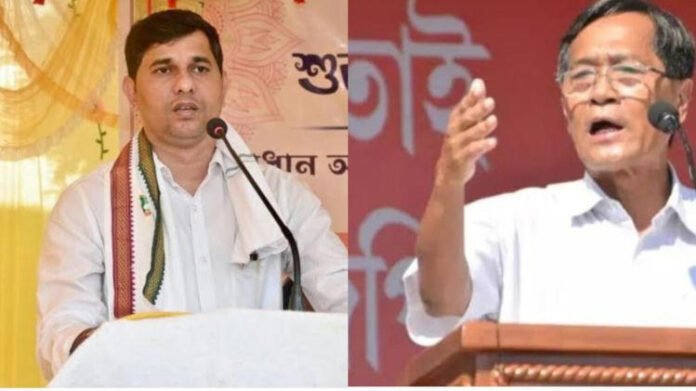Tripura, a northeastern state in India, is no stranger to political tensions, but recent developments have thrown the state into a fresh wave of political turmoil. At the center of the controversy is an alleged communal social media post made by a state minister, which has sparked outrage across party lines. The post, which many claim promotes divisive sentiments, has led to strong reactions from opposition parties demanding immediate action against the minister.
The Alleged Post and the Public Outcry
The controversy erupted when a social media post allegedly made by Minister Ranjit Kumar Das was brought to public attention. The post, which contained inflammatory language against a particular community, quickly went viral and became the focal point of a heated debate. Although the post was soon deleted, screenshots of the content were widely circulated, with many accusing the minister of spreading hatred and intolerance.
The allegations against the minister are serious, as the post was seen as a blatant attempt to incite communal unrest. Political leaders from various opposition parties have condemned the remarks and called for swift legal and political action.
Opposition’s Demand for Accountability
In response to the post, opposition parties, including the Congress and the Left Front, have been vocal in their criticism of the minister. They have accused the Bharatiya Janata Party (BJP)-led government in Tripura of turning a blind eye to communal statements made by its leaders. The opposition has demanded that the chief minister and the party leadership take immediate action, including initiating a thorough investigation into the minister’s actions.
The Congress has called the post a deliberate attempt to polarize the electorate ahead of upcoming elections. “This kind of language is dangerous for the social fabric of our state. It is a calculated move to stir communal tensions and divide people along religious lines. The government cannot afford to remain silent,” said a senior Congress leader.
The Left Front, which has been a significant political force in the state for decades, also voiced concerns over the implications of such posts. They have asked the government to expel the minister from the cabinet and take legal action against him, warning that failure to do so would send the wrong message to the public about the state’s commitment to maintaining harmony and peace.
BJP’s Defense and Political Implications
While the opposition has been vocal in its criticism, the BJP has defended the minister, calling the allegations baseless. Party leaders argue that the post in question was taken out of context and that the minister did not intend to hurt any community. Some BJP members claim that the opposition is merely trying to create unnecessary political noise ahead of the upcoming elections.
This controversy comes at a time when Tripura is facing a crucial electoral battle. The BJP, which has been in power since 2018, is keen on maintaining its hold over the state, while the opposition parties are rallying to challenge its dominance. The allegations against the minister have given the opposition fresh ammunition to attack the BJP, accusing the ruling party of tolerating divisive rhetoric in its ranks.
This controversy also shines a light on the broader political landscape in Tripura, where issues of ethnicity, religion, and regional identity have often played a central role in shaping political discourse. The state has witnessed sporadic incidents of communal violence in the past, and the opposition fears that such posts could escalate tensions between communities, leading to instability.
Public Sentiment and the Role of Social Media
The impact of social media on politics cannot be overstated, especially in the digital age. Social media platforms like Facebook and Twitter have become powerful tools for politicians to connect with voters, but they also carry the risk of spreading harmful messages. In Tripura, where ethnic and communal sensitivities run high, a single post can ignite widespread anger and polarization.
The minister’s alleged post has sparked a broader conversation about the role of social media in influencing public opinion and its potential for misuse. Many citizens have expressed concern over the growing trend of politicians using social media to make controversial statements, often without consequences. This has raised questions about the need for stricter regulations to prevent the spread of hate speech and misinformation online.
What’s Next for Tripura?
As the political turmoil in Tripura continues to unfold, it remains to be seen how the state government will handle the situation. The chief minister, Biplab Kumar Deb, has yet to comment publicly on the issue, but pressure is mounting on the government to take action. With the opposition mobilizing its forces and calling for the minister’s resignation or removal, the issue is likely to remain a hot topic in the days leading up to the next state elections.
The controversy also serves as a reminder of the delicate balance required in maintaining communal harmony in a state like Tripura, where political tensions often intersect with ethnic and religious fault lines. As the state grapples with its political future, the demand for accountability and responsible leadership has never been more crucial.

